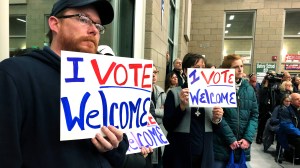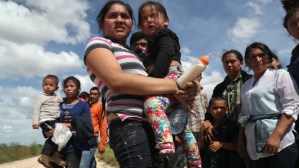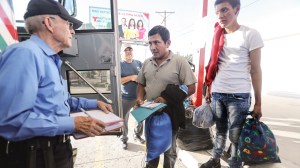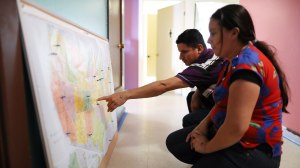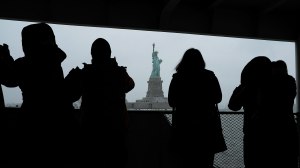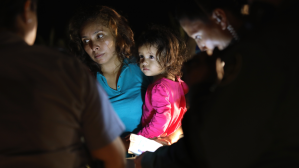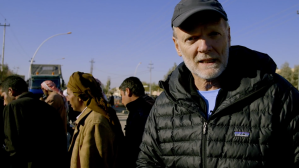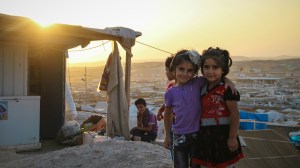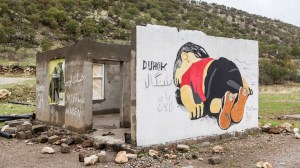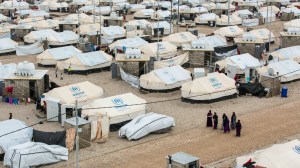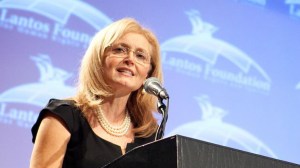In this series
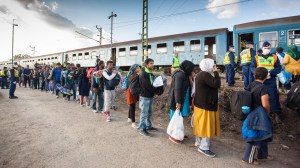
A maximum of 30,000 refugees will be allowed to resettle in the United States next fiscal year. The new ceiling imposed by the Trump administration marks a dramatic decrease from this fiscal year’s 45,000-person cap, which had also been a significant reduction.
For three decades before that, the US resettlement ceiling hadn’t dropped below 70,000.
The policy shift was announced by US Secretary of State Mike Pompeo on Monday; evangelical and Catholic advocates for refugees were quick to push back.
“This repeated reduction in the number of refugees allowed into the US is incredibly troubling,” said World Relief CEO Tim Breene following Pompeo’s announcement. “Not only is it a continuation of a series of unprecedented attacks on our American values and on the humanitarian nature of the refugee resettlement program, but it falls far short of helping the large number of vulnerable people around the world.”
Joe S. Vásquez, chair of the US Conference of Catholic Bishops’ Committee on Migration, called the decrease “deeply disturbing” and said it “leaves many human lives in danger.”
“To cut off protection for many who are fleeing persecution, at a time of unprecedented global humanitarian need, contradicts who we are as a nation,” he said.
Pompeo, who initially argued to keep the number stable at 45,000, defended the administration’s change, asserting it was actually a positive reflection of American values.
“Our proposal of resettling up to 30,000 refugees under a new ceiling reflects the United States’s longstanding record as the most generous nation in the world for protection-based immigration and assistance,” he said.
The feud over resettlement numbers comes as the number of displaced people worldwide reaches record highs. According to the UN High Commissioner for Refugees, there are 68.5 million displaced people in the world today, more than 28 million of whom are considered refugees or asylum-seekers.
Already in the United States, record-low numbers of refugees are being resettled.
Despite a refugee cap of 45,000 for the current fiscal year, which ends September 30, the US is on track to welcome less than 22,000 refugees.
In August, the leaders who make up the Evangelical Immigration Table (EIT)—including the presidents of the National Association of Evangelicals, World Relief, and the Ethics and Religious Liberty Commission of the Southern Baptist Convention (SBC)—argued against future cuts.
In a letter to government officials, including Pompeo and ambassador-at-large for international religious freedom Sam Brownback, the EIT expressed “deep concern about the impact on international religious freedom of recent changes in the US refugee resettlement program.”
Citing the dramatic downward trend in resettlement numbers over the last year, EIT leaders, as well as more than 400 pastors and lay leaders who signed onto the letter, urged the US government to “resume refugee resettlement at a level consistent with historical norms.” They also recommended returning the refugee ceiling to 75,000.
The SBC’s Russell Moore said yesterday the drop “should be a shock to the conscience of all Americans.”
“As a Christian, I am concerned for the well-being of all those in peril,” he said. “And I stand in solidarity with my brothers and sisters in Christ in the persecuted church, many of whom will be harmed by this closed door.”
Scott Arbeiter, EIT leader and president of World Relief, said yesterday the downturn doesn’t reflect the capacity or willingness of Americans to welcome refugees and that “this decision contradicts the administration’s declared commitment to helping persecuted Christian and religious minorities in dangerous and oppressive countries.”
The decay of America’s refugee program has proven stark for persecuted Christians and other religious minorities around the world, especially in the Middle East where, in places, they endure genocide at the hands of the Islamic State and face the blockade of President Trump’s ongoing travel ban.
During the first six months of 2016, nearly 1,600 Christians from the Middle East were admitted to the United States. In the first half of 2018, only 23 were let in, according to the EIT letter.
“In short, cuts to our refugee admission program affect all persecuted religious minorities,” the letter reads, “but these cuts significantly impact our persecuted brothers and sisters in Christ.”
Using the latest State Department data, World Relief’s US director of church mobilization Matthew Soerens analyzed the withering of the country’s refugee resettlement.
As of September 11, the US had let in just shy of 11,000 Christian refugees, he found. During the same period in 2016, more than 27,000 Christian refugees were welcomed. The numbers are even harsher for Muslims, who have seen a 92 percent decline in the number of refugees resettled in the US between 2016 and 2018.
Based on Soerens’s analysis, Christian refugee admissions are plunging as only 18 Iraqi, 9 Syrian, and 5 Iranian believers have been accepted into the US so far this calendar year.
Looking at the 11 countries Open Doors USA identifies as those where Christians face the “most extreme” persecution, only 699 Christians refugees from those nations have been allowed to resettle in the Land of the Free in 2018. That’s a 70 percent decrease from the 2,272 Christians resettled from those countries in the same period in 2016.
During a September 12 press call with the EIT and leading advocates for America’s resettlement programs, Jenny Yang, senior vice president of advocacy and policy for World Relief, spoke out against the shrinking resettlement ceiling for its effect on persecuted peoples around the globe.
“The drastic decline in refugee resettlement over the past couple years has meant that far fewer persecuted people, including those persecuted for their Christian faith, have been able to find safety and religious freedom in the US,” she said. “A further cut to the ceiling for refugee resettlement would harm even more people persecuted for their faith.”
Nathan Bult, director of government affairs for Bethany Christian Services, echoed the sentiment. “Every refugee has a name, every refugee has a story, and every refugee matters to God — that means every refugee should matter to us,” he said.
Many on the call, which came prior to the official ceiling drop, and many others since have called for the president to raise the resettlement ceiling back to 75,000.
Galen Carey, the vice president of government relations for the National Association of Evangelicals, is among them.
“Over the past 40 years, American evangelical Christians have opened their hearts and homes to hundreds of thousands of refugees, including many persecuted believers who would otherwise not be alive today,” he said. “This extraordinary ministry of mercy has nearly ground to a halt as the sharp reduction in refugee resettlement approvals has left tens of thousands of refugees stranded in dangerous refugee camps and settlements. We can and must do much better than this.”
In a statement from the Lutheran Immigration and Refugee Service (LIRS), its vice president for programs Kay Bellor described the administration’s actions as endangering lives when “we stand ready to welcome those who seek refuge into our communities.”
Pompeo held the line. He said the decision reflects the current administration’s desire to see refugees resettled closer to their home countries. He also pointed to the nation’s larger immigration program, redirecting focus from refugees abroad to asylum-seekers already here.
According to Pompeo, the policy change is also a security decision. He noted the government’s duty to responsibly vet refugee candidates to thwart potential threats to the United States.
Looking ahead, scores of Christian leaders and advocates passionate about refugee issues will gather in Sarajevo for the 17th Refugee Highway Partnership, a roundtable happening in February for practitioners and influencers working on behalf of refugees and the gospel.
More than 60 Christian groups will unite to collaborate and press the case of refugees and migrants in the face of mounting political opposition.
CT previously examined how fewer persecuted Christians are finding refuge in the US.


